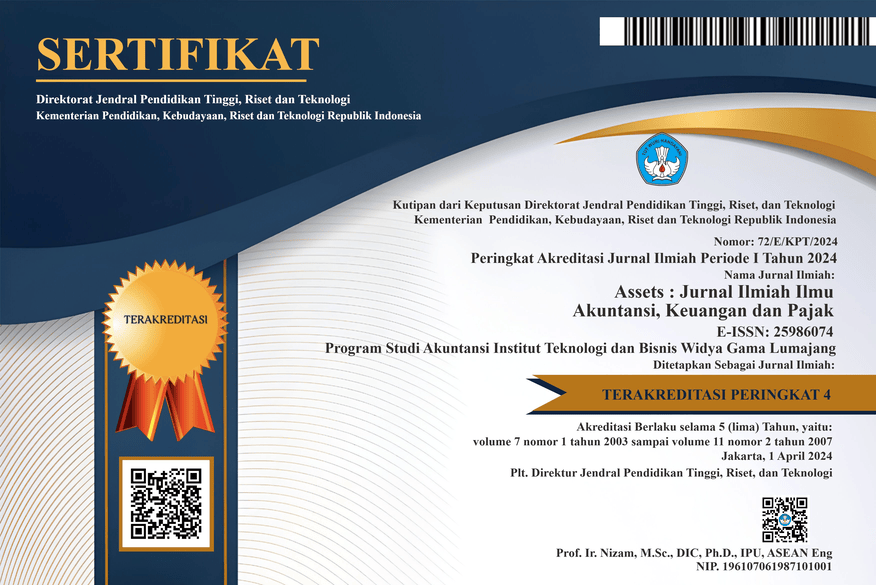The Concept of "Mental Accounting" as the Spirit of Personal Financial Management for Millennial Women
DOI:
https://doi.org/10.30741/assets.v8i1.1226Keywords:
Mental Accounting, Accounting Behavioral, Millenial FinancialAbstract
The research objective seeks to examine the ethno-economic dimensions that encourage Millennial Women to form behavioral decisions in managing personal finances. The novelty in this research is describing and analyzing the concept of "Mental Accounting" in managing personal finances, thus creating financial independence for women in Indonesia and becoming a new color in accounting research. The ethno-economic method was chosen in the research with the aim of explaining the reality of the behavior of the millennial generation in managing personal finances. The results of the study found the meaning of the concept of "mental accounting" applied by Millennial Women in managing personal finances in accordance with the Ethno-Economic dimension, namely past financial expenditure, budgeting planning for future expenditure and financial behavioral decisions. The theoretical contribution to this research is to strengthen the concept of "Mental Accounting" and human capital theory. The practical contribution of this research can be used as a basis for forming a personal financial management model for millennial women in Indonesia.
Downloads
References
Abio, G., Patxot, C., Souto, G., & Istenič, T. (2021). The role of gender, education and family in the welfare organization: Disaggregating National Transfer Accounts. The Journal of the Economics of Ageing, 20, 100348. https://doi.org/10.1016/j.jeoa.2021.100348
Carrasco-Gallego, J. (2017). Introducing economics to millennials. International Review of Economics Education, 26. https://doi.org/10.1016/j.iree.2017.08.002
Creswell, J. W. (2016). Research Design: Pendekatan Metode Kualitatif, Kuantitatif dan Campuran (Edisi Keem). Pustaka Pelajar.
Campuran. Cetakan 1. Penerbit Pustaka Pelajar: Yogyakarta.
Fatchan, Achmad. (2013). Metode Penelitian Kualitatif 10 Langkah Penelitian Kualitatif Pendekatan Konstruksi dan Fenomenologi. Penerbit UM Press : Malang.
Hartono, B., Purnomo, A., & Andhini, M. (2020). PERILAKU INVESTOR SAHAM INDIVIDU DALAM PERPEKTIF TEORI MENTAL ACCOUNTS. Competence : Journal of Management Studies, 14, 173–183. https://doi.org/10.21107/kompetensi.v14i2.8957
Ningtyas, M. (2019). Literasi Keuangan pada Generasi Milenial. Jurnal Ilmiah Bisnis Dan Ekonomi Asia, 13, 20–27. https://doi.org/10.32812/jibeka.v13i1.111
Ozkan, Mehmet and Ozkan, Ozgur. (2020). Financial Evaluation of Mental Accounting. Journal of Accounting, Finance and Auditing Studies, Vol 1, No. 6: 86 – 118.
Pradiningtyas, T., & Lukiastuti, F. (2019). Pengaruh Pengetahuan Keuangan dan Sikap Keuangan terhadap Locus of Control dan Perilaku Pengelolaan Keuangan Mahasiswa Ekonomi. Jurnal Minds: Manajemen Ide Dan Inspirasi, 6, 96. https://doi.org/10.24252/minds.v6i1.9274
Wahyuni, S. F., Radiman, R., & Kinanti, D. (2023). Pengaruh Literasi Keuangan, Lifestyle Hedonis dan Sikap Keuangan Pribadi Terhadap Perilaku Keuangan Mahasiswa. Owner, 7(1), 656–671. https://doi.org/10.33395/owner.v7i1.1304
Yin, R. K. (2019). Studi Kasus: Desain dan Metode (Ed. 1). Rajawali Pers.
Yushita, A. N. (2017). Pentingnya Literasi Keuangan Bagi Pengelolaan Keuangan Pribadi. Nominal, Barometer Riset Akuntansi Dan Manajemen, 6(1). https://doi.org/10.21831/nominal.v6i1.14330
Downloads
Published
How to Cite
Issue
Section
License
Copyright (c) 2024 Sukma Uli Nuha, Ria Meilan, Alfinatul Qoni’ah

This work is licensed under a Creative Commons Attribution-NonCommercial 4.0 International License.









